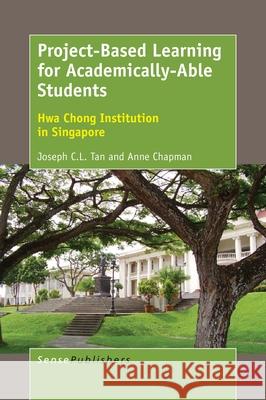Project-Based Learning for Academically-Able Students » książka
Project-Based Learning for Academically-Able Students
ISBN-13: 9789463007313 / Angielski / Twarda / 2016 / 160 str.
Project-Based Learning for Academically-Able Students
ISBN-13: 9789463007313 / Angielski / Twarda / 2016 / 160 str.
(netto: 420,89 VAT: 5%)
Najniższa cena z 30 dni: 423,64
ok. 22 dni roboczych.
Darmowa dostawa!
This book explores the dynamic approach to student-centred learning known as project-based learning, or project work. It addresses both the concepts and practical application of project-based learning to enhance teaching and learning. It describes empirical case study research into the impact of research-based project work on independent learning for academically-able secondary school students at Hwa Chong Institution, a premier independent school in Singapore. The research investigated how students dealt with an innovative project-based learning curriculum built on a social constructivist approach designed to foster independent learning attitudes. The students had to research and initiate their own projects, and see through the entire process with guidance from their teacher mentors. The case study findings give rich insights into student perspectives and experiences as they engage in projects and respond to real-life challenges and problems. A new theory of project-based learning is presented in the form of theoretical propositions. The research has implications for the professional development of teachers as project work mentors to help prepare their students to be 'future-proof' in dealing with 21st century study, work and social challenges with confidence. The book highlights compelling reasons for schools to include some form of research-based project work within their curricula, thereby allowing students to engage in collaborative, authentic research.
This book explores the dynamic approach to student-centred learning known as project-based learning, or project work. It addresses both the concepts and practical application of project-based learning to enhance teaching and learning. It describes empirical case study research into the impact of research-based project work on independent learning for academically-able secondary school students at Hwa Chong Institution, a premier independent school in Singapore. The research investigated how students dealt with an innovative project-based learning curriculum built on a social constructivist approach designed to foster independent learning attitudes. The students had to research and initiate their own projects, and see through the entire process with guidance from their teacher mentors. The case study findings give rich insights into student perspectives and experiences as they engage in projects and respond to real-life challenges and problems. A new theory of project-based learning is presented in the form of theoretical propositions. The research has implications for the professional development of teachers as project work mentors to help prepare their students to be ‘future-proof’ in dealing with 21st century study, work and social challenges with confidence. The book highlights compelling reasons for schools to include some form of research-based project work within their curricula, thereby allowing students to engage in collaborative, authentic research.











